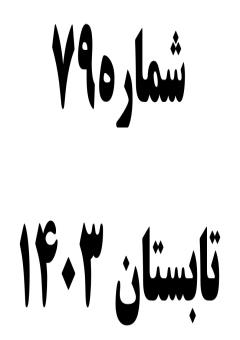ارائه الگوی دانشگاه فرهنگساز با تاکید بر رویکرد توسعه پایدار
محورهای موضوعی : مدیریت آموزشی
مائده بیک زاده درونکلائی
1
,
ترانه عنایتی
2
*
![]() ,
مهسا غلامحسین زاده
3
,
مهسا غلامحسین زاده
3
![]()
1 - دانشجوی دکتری گروه مدیریت آموزش عالی، واحد ساری، دانشگاه آزاد اسلامی، ساری، ایرانو maedehbeykzadeh9@gmail.com
2 - گروه مدیریت آموزشی، دانشکده علوم انسانی، واحد ساری، دانشگاه آزاد اسلامی، ساری، ایران.(نویسنده مسئول) tenayati@yahoo.com
3 - گروه مدیریت آموزشی، دانشکده علوم انسانی، واحد ساری، دانشگاه آزاد اسلامی، ساری، ایران.
کلید واژه: فرهنگ, دانشگاه فرهنگساز, توسعه پایدار,
چکیده مقاله :
هدف این پژوهش ارائه الگوی دانشگاه فرهنگساز با تاکید بر رویکرد توسعه پایدار، است. جامعه پژوهش حاضر را خبرگان مرتبط با مبحث تحقیق در دانشگاههای علوم پزشکی مازندران، تشکیل دادند. در بخش کیفی این تحقیق با استفاده از روش هدفمند گلوله برفی، از نظرات 16 نفرخبره استفاده شد. همچنین، در بخش آماری تحقیق و بر اساس روش نمونه گیری در دسترس و روش تحلیل توان، از نظرات 288 نفر از کارشناسان مرتبط با مبحث تحقیق استفاده گردید. ابزار و روش تجزیه و تحلیل دادهها در بخش کیفی و کمی، به ترتیب مصاحبه - گرندد تئوری و پرسشنامه - مدلسازی معادلات ساختاری با رویکرد (PLS) است. نتایج تحقیق نشان داد، الگوی تحقیق دارای دارای پنج بُعد اصلیِ شرایط علی شاملِ لزوم آگاهی از نحوه تاثیرگذاری فرهنگ بر توسعه پایدار، اثر مثبت دانشگاه فرهنگساز بر توسعه محیطی، اجتماعی و اقتصادی، موضع تدافعی و انفعالی دانشگاه در مباحث فرهنگی؛ شرایط زمینهای شاملِ کارکنان دانشگاه و برنامههای درسی، تحقیقاتی و دورههای آموزشی فرهنگساز؛ شرایط مداخلهگرانه شاملِ سیاستگذاریها و قوانین ملی و فراملی؛ استراتژیها و راهبردها شاملِ شبکهسازی در راستای تعامل فرهنگی در حوزه محلی، منطقهای و جهانی، تحقیق در دانشگاهها با هدف فرهنگسازی در حوزه توسعه پایدار، آموزش در دانشگاهها با هدف فرهنگسازی در حوزه توسعه پایدار و جریان سازی و ارائه یک الگوی فرهنگساز؛ نتایج و پیامدها شاملِ ایجاد فرهنگ توسعه اقتصادی، ایجاد فرهنگ توسعه اجتماعی و ایجاد فرهنگ توسعه زیستمحیطی است.
The purpose of this research is to Presenting the culture-building university model with an emphasis on the sustainable development approach. In the qualitative part of this research, the opinions of 16 experts in Mazandaran universities of medical sciences were used with the purposeful snowball method. In the quantitative part of the research, with available sampling method and power analysis method, the opinions of 288 experts related to the research topic were used. The tools and methods of data analysis in the qualitative and quantitative part are interview-grounded theory and questionnaire-structural equation modeling (PLS), respectively. The results of the research showed that the research model has five main dimensions of causal conditions, including the need to know how culture influences sustainable development, the positive effect of a culture-creating university on environmental, social and economic development, the defensive and passive position of the university in cultural issues; background conditions including university staff and curriculum, research and culture-creating training courses; Intervening conditions including national and transnational policies and laws; Strategies and strategies include networking in the direction of cultural interaction in the local, regional and global spheres, research in universities with the aim of creating culture in the field of sustainable development, education in universities with the aim of creating culture in the field of sustainable development and streamlining and presenting a culture-creating model; The results and consequences include creating a culture of economic development, creating a culture of social development and creating a culture of environmental development.

